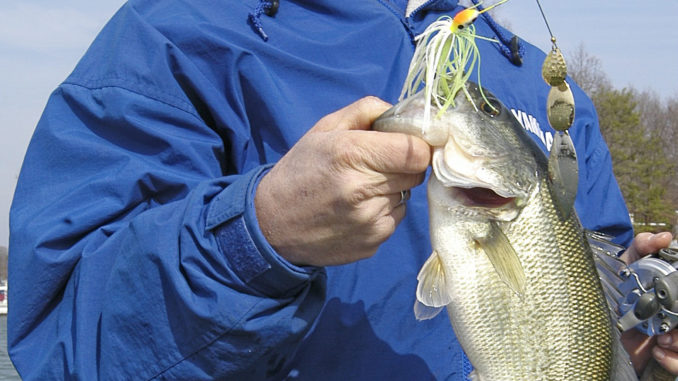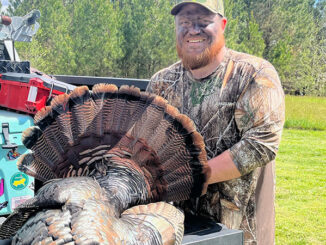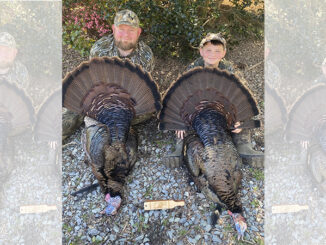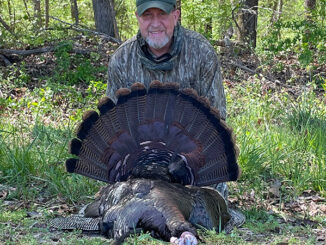
The Piedmont Triad Regional Water Authority, which controls access to Randleman Dam Reservoir in Randolph and Guilford counties, wants to set creel and size limits for gamefish on the 3,007-acre lake, but a bill introduced in the state legislature has met with chilly reception from the N.C. Wildlife Resources Commission.
Prompted by the PTRWA, Rep. Harold Brubaker (R-Asheboro), introduced a bill (H 519) to give it the authority to regulate fishing on the lake, which opened March 1, 2010 and produced almost immediate adulation among fishermen, especially those targeting largemouth bass.
The Commission, which manages fisheries in most North Carolina reservoirs, setting size and creel limits, isn’t thrilled with having its authority to manage fisheries challenged as it is in Brubaker’s legislation, but PTRWA’s boss said it got an invitation to do just that.
“The (PTRWA) wanted to help protect the fishery with a stricter limit on the size of (bass) originally set by the Wildlife Commission,” said John Kime, PTRWA’s executive director. “One of their biologists came up and did some electroshocking sampling and gave us a report. We had some discussions with the Wildlife Commission, and they said we could introduce a local bill (in the legislature).”
Commission regulations allow fishermen to keep five largemouth bass per day at most large reservoirs, including Randleman. Bass must be at least 14 inches long to be creeled.
Bob McDuffie, a PTRWA board member from Randolph County and a former tournament fisherman, said a slot limit for bass is the authority’s goal.
“I believe we’ve got the best (bass) fishery in the state, but it’s typical of a new lake in the beginning, like Jordan Lake was, and we want to protect the brood fish between 16 and 22 inches,” he said. “Lakes like this often start out good, then go downhill.”
Two major issues appear to separate PTRWA and the WRC — one is scientific and the other regulatory.
“The way fisheries should be managed is, (the Commission) has a model of conservation that is tried and true, formed from agency science and public input,” said Gordon Myers, the Commission’s executive director. “Then, in subsequent action, if people are opposed (to management ideas), we have more public input, and that often changes what we do, as happened a few years ago (with deer proposals).”
“We weren’t sure early on that PTRWA’s idea was to form a trophy bass fishery, but that’s pretty clear now. However, our first concern is that biologically, a slot limit is not the way to do that at the lake. What you need is to harvest (small) fish so you have less competition (for food), which produces bigger fish.”
McDuffie admitted that his board disagrees with the Commission, but he wouldn’t criticize its lack of support for the bill.
“In no way am I going to badmouth the Wildlife Commission,” he said. “They do a fantastic job with limited resources, but we disagree on the way we should go.
McDuffie said PTRWA had received advice from Barry Smith, a former Alabama state fisheries biologist who owns a fish-stocking company (American Sport Fish).
“He’s a respected fish biologist and an expert we’ve listened to,” McDuffie said. “We’re not trying to do anything detrimental to the fishery.”
McDuffie also said he had heard from “lots” of fishermen at Randleman Dam who supported the idea of a slot limit.
However, Myers said he doesn’t believe PTRWA had the authority under state law to declare catch and size limits, and Brubaker’s bill would bypass public input.
“The lake was formed by damming Deep River,” Myers said. “All the fish in the river belong to the public, and thus those fish now in the lake also belong to the public, not the PTRWA. Not only that, but (the Commission) stocked 180,000 bass and 60,000 channel catfish in the lake.”
Those fish were reared at state hatcheries paid for with sportsmen and taxpayer funds.
“We have a strong philosophical difference (with PTRWA),” Myers said. “(PTRWA) is in the water-supply business; the Wildlife Commission is in the fishery and wildlife management business.”
Myers also said Commission staff members never advised PTRWA to use a legislative bill to change fishing management at Randleman Dam.
Joel Richardson, a guide from Kernersville who often fishes at Randleman Dam, said he doesn’t oppose a slot limit to create and maintain the impressive sizes of bass in the lake. He said he is concerned after what he witnessed last year at the lake.
“There were a lot of ‘meat’ fishermen,” he said. “I don’t mind people putting bass in their boats, but if you put in a slot limit, say 16 to 20 inches like they use at (Shearon) Harris Lake, it would help protect the quality of fishing.”
Richardson pointed out fishermen have pressured Shearon Harris largemouths for years but continue to land impressive stringers of 7-, 8-, 9- and 10-pound bass.
“That’s because of the slot limit,” he said. “I think thiscould be as good as Harris for a long time with a slot limit.”
However, Myers said Commission biologists aren’t convinced the slot limit is the prime reason for the trophy fishery at Harris.
“We think there may be another factors,” he said, pointing to an outstanding forage base and great habitat created by aquatic grasses. “But we had a lot of anglers who fish there ask for a slot limit, so we agreed.
“What you (would) have with a slot limit (at Randleman) would be a de facto limit of 20 to 23 inches, so you’d have very minimal harvest, which is the opposite of what you want (to produce a trophy fishery),” Myers said. “I suspect most of the (fishermen) at Randleman Dam are practicing catch-and-release, but nobody knows because we didn’t do a creel survey (last year). That’s information you need, first of all, before you start changing rules.”
Myers said he had met with Rep. Brubaker to explain the Commission’s position.
“He seems genuinely interested,” Myers said. “Everyone has good intentions, and I think he wants to put us together. He’s open for discussions as we look for common ground.”





Be the first to comment